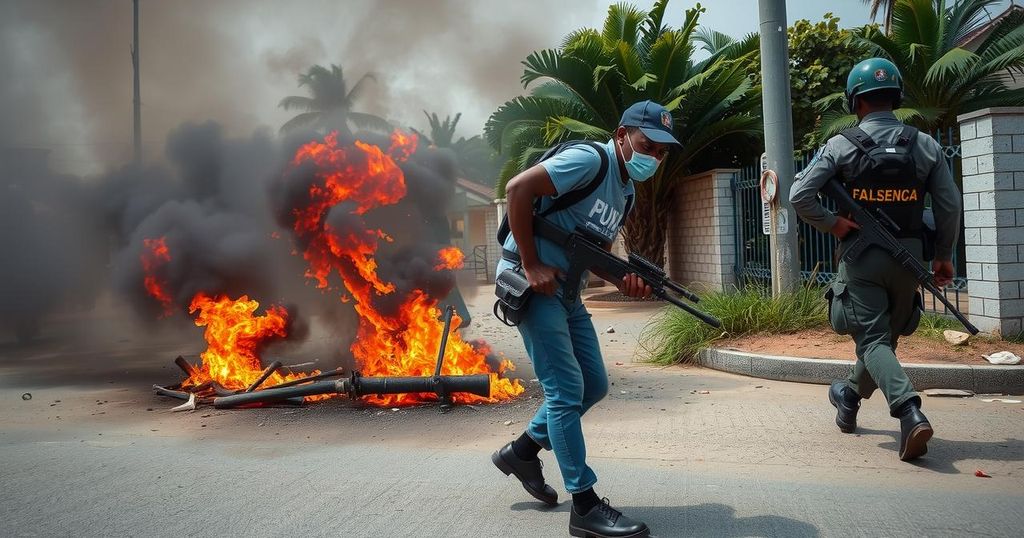Politics
2024 ELECTIONS, AFRICA, BERNADINO RAFAEL, CONSTITUTIONAL COUNCIL, CORRUPTION, DANIEL CHAPO, DEMOCRACY, FILIPE NYUSI, FRELIMO PARTY, GOVERNANCE, MOZAMBIQUE, MOZAMBIQUE CONSTITUTIONAL COUNCIL, NEW YORK TIMES, NORTH AMERICA, POLITICS, U. S, UNITED STATES, UPI, VAN, VANANCIO MONDLANE
Leila Ramsay
0 Comments
Mozambique Faces Deadly Political Unrest Amid Contested Elections
Mozambique faces severe political unrest with at least 21 deaths reported since Monday due to protests against disputed election results. Opposition leader Vanancio Mondlane challenges the legitimacy of the elections won by the Frelimo Party, claiming fraud. He intends to declare himself president on January 15, leading to calls for peaceful resolutions amidst escalating violence and international scrutiny regarding the election process.
At least 21 fatalities have been reported since Monday amid ongoing political turmoil in Mozambique. This unrest follows the announcement of disputed election results by the Mozambique Constitutional Council, which affirmed the victory of the Frelimo Party candidate, Daniel Chapo, garnering 65.2% of the vote over opposition leader Vanancio Mondlane, who received 24%. Protests ignited after Mondlane claimed the elections were marred by irregularities and fraud. The recent wave of violence has led to over 70 arrests and has transpired in the backdrop of Mondlane’s challenge to the election results, which he claims were rigged. In a bold declaration, Mondlane pledged to assume the presidency on January 15, despite having lost the election. He urged his supporters to refrain from violence while asserting that he represents the people’s will. Human rights organizations have alleged that many of the deaths during protests are attributable to security forces, although police maintain that they acted in self-defense against hostile demonstrators. The international community, including U.S. officials, has noted concerns regarding the transparency and integrity of the electoral process.
As the nation grapples with this strife, Mozambicans continue to face an atmosphere fraught with uncertainty regarding their political future. Current President Filipe Nyusi’s imminent exit after two terms adds further complexity to the situation. Observers are calling for accountability and peaceful resolution among all political stakeholders as clashes between police and the opposition’s supporters persist. Every effort must be made to ensure elections reflect the collective will of the citizens without violence and repression.
The political unrest in Mozambique stems from long-standing tensions between the ruling Frelimo Party and opposition entities, particularly following events surrounding the Oct. 9 elections. Frelimo has dominated the political landscape for 49 years, and any challenge to its authority is met with significant resistance. The legitimacy of the recent electoral process has been brought into question, leading to widespread protests against the government’s alleged misconduct and fraudulent practices. The international community’s involvement, including U.S. perspectives on the situation, signifies broader concerns about democratic governance in Mozambique and the upholding of human rights amidst political dissent.
In summary, Mozambique is currently experiencing a significant and potentially destabilizing political crisis marked by violence and contested electoral results. With the opposition leader’s bold claims to legitimacy and calls for peaceful protest, the situation remains precarious. The need for accountability and dialogue among all parties is paramount to restoring peace and ensuring that the political processes respect the will of the people. As tensions continue to rise, the world awaits how Mozambique’s political landscape will unfold in the coming weeks.
Original Source: www.upi.com




Post Comment